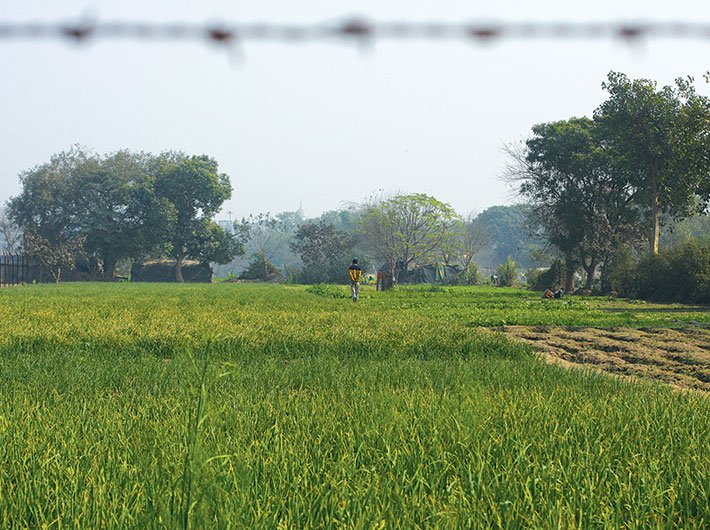For the nation’s food security, it makes sense to provide economic security to the farmer. Is price deficiency payment the solution?
Should the practice of paying farmers a minimum support price (MSP) for some crops be scrapped? That is what several experts have suggested. This is part of the discourse that follows the recent supreme court advice to the government to formulate a national policy to protect farmers.
MSP has been the only crutch that the farmers have been holding on to as a sort of guarantee of some remuneration for their investment of money, labour and time. But a task force on agriculture set up by the NITI Aayog has suggested that it be replaced by what it calls a price deficiency payment (PDP).
Let us first understand MSP. It is the price assured for commodities that are procured by the government. But not all commodities are procured by the government. Nor does the government procure them in all the places or all the time.
So if rice and wheat are procured in some places, they may not be procured in some other places. All pulses may not be procured though procurement prices may be announced for them. And hence it is not necessary that private buyers would even pay farmers the MSP. However, the MSP does help the farmers with a certain assurance. It also artificially influences market prices.
The task force feels that MSP does not serve the purpose of assuring a remunerative price for the farmer. “This goal cannot be achieved through procurement backed MSP since it is neither feasible nor desirable for the government to buy each commodity in each market in all regions,” says the task force in its report submitted to NITI Aayog in December last year.
The alternative it proposes is a system of price deficiency payment. PDP is nothing but a sort of subsidy to the farmer in case he fails to get the equivalent of MSP in the open market. For example, if the MSP for wheat is Rs 1,200 per quintal and he gets just Rs 700 in the open market, the government would be bound to pay him the balance, Rs 500.
But the question is does the MSP take into account the money the farmer invested in the crop in the first place?
Vijay Jawandhia, a farmer activist from Yavatmal in Vidarbha, says there is a mismatch between the two. “The MSP is much lower than the cost of production, and does not even consider profit. So what is the use of a regime which tries to ensure MSP?” he asks.
The NITI Aayog panel of experts says that PDP would help prevent unwanted stocks and spread price incentives to producers in all the regions and all crops. It suggested that to assess its viability, cotton may be adopted as a test crop for pilot in selected districts of leading states.
The PDP system was to be tried out in Maharashtra. However, there was no crop failure, and hence no need for any government support; so the pilot never happened, says Jawandhia.
Jawandhia, who has led the Shetkari Sanghatna in Maharashtra for decades, has no hopes with either the NITI Aayog or the current case in the supreme court which is looking at an NGO-led petition on farmers suicides.
“These are stage-managed shows and I have no faith in them. Besides, this whole talk of agrarian distress in areas where there are farmer suicides gives the impression that all is well in other areas,” he says. The realities of farming are the same for all farmers, and the government must look at a comprehensive plan for all of them before it is too late, says Jawandhia.
The only solution, he feels, can be an internal state protection of the kind that is provided in the western world. For this, India will have to come out of the WTO limits. “If it doesn’t want to do this, then it can continue to manipulate the numbers of suicides in the NCRB [national crime record bureau],” he adds sarcastically.
Agriculture economist Devinder Sharma feels that PDP is nothing but an apology for making farming remunerative. “Four crops failed in Rajasthan and if the government were to compensate farmers for all four it would have to shell out Rs 4,000 crore. The intervention fund it has is not more than Rs 1,500 crore. So what is it talking about?” he asks.
The real solution he feels is to provide an assured income.
He cites the example of the seventh pay commission and says: “We are shocked when we hear about spending a few crores on farmers’ income. But we don’t find it a burden on economy to dole away Rs 4.7 lakh crore to government employees by way of HRA, etc. as part of the seventh pay commission recommendations. Why can’t we spend the same amount to provide assured income to farmers? The government employees are merely one percent of the workforce. Is the government responsible only for one percent of the populace?’’ asks Sharma.
As for the MSP, it benefits just six percent of farmers. The various committees set up to look into the problems of farmers, like those headed by Shanta Kumar and MS Swaminathan, talked about increasing the MSP. But, asks Sharma, “What about the 94 percent of farmers?”
He proposes an income of Rs 18,000 for every farmer. “If a farmer’s earnings are just Rs 5,000, then he should be given the balance amount,” he says, rejecting ideas like PDP.
How will the government raise the necessary funds to pay every farmer? He says: “Let the government scrap the seventh pay commission recommendations and give the Rs 4.8 lakh crore meant for government employees to the farmers. Let them make a start like that. Let them at least create a mechanism for paying farmers in cash or kind.”
Jawandhia says that these are just hypothetical theories. The least the state could do is to provide basic educational, healthcare and economic protection to farmers. “The government should use subsidies to ensure that farmers get a good price for their crops, whether in the country or when they export it,” he says.
Activist Kishore Tiwari of Vidarbha reiterates what Jawandhia says. Farmers and their families need economic security. His organisation, Vasantrao Naik Sheti Swavlamban Mission, works in 14 districts where there have been a relatively higher number of suicides.
feedback@governancenow.com
(The article appears in the August 16-31, 2017 issue of Governance Now)

